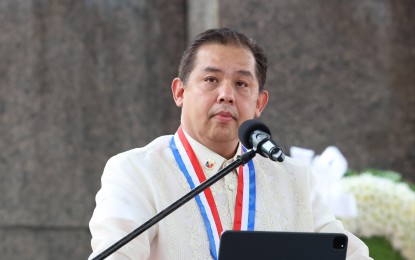
House Speaker Martin Romualdez (File photo)
MANILA – House Speaker Martin Romualdez on Wednesday urged the Bureau of Internal Revenue (BIR) to simplify the estate tax amnesty application procedure and allow online filing, especially for heirs who are overseas Filipino workers (OFWs).
Romualdez made this call after the bill extending the period of availment of the estate tax amnesty until June 14, 2025 had lapsed into law as Republic Act (RA) No. 11956.
He said the pandemic and the financial and economic difficulties it had caused made it hard for thousands of heirs, especially those in the provinces, to take advantage of the benefits of the current RA 11213, or the Tax Amnesty Act, enacted on Feb. 14, 2019.
“They have already suffered enough because of the pandemic. Let us not make the situation more difficult for them by giving them more time to avail themselves of those benefits,” he said.
If the President does not act on a proposed law submitted by Congress, it will lapse into law after 30 days from receipt.
Romualdez, principal author of the law at the House of Representatives, said the new two-year extension would give almost 1 million families enough time to avail themselves of the amnesty and lower tax rates so they could settle their estate tax obligations and use the properties and other assets they have inherited from their dead loved ones.
“Bumabawi pa lamang ang karamihan sa Covid-19 pandemic at napaso na ang amnesty deadline na isang beses nagkaroon ng ekstensyon kaya kailangan ng panibagong batas dito na pakikinabangan ng maraming pamilyang Pilipino (We are yet to recover from Covid-19 pandemic and we already met the amnesty deadline which for once had an extension so we need now a new [extension] law for the benefit of more Filipino families),” he said.
He added that target beneficiaries include legal heirs, and estate executors and administrators.
The payment of estate taxes, he said, would not only result in additional tax revenue for the government but in the faster distribution and use of inherited properties like land as well.
The sale and/or development of those properties would generate income, jobs and economic activities, he said, as he appealed to intended beneficiaries to take advantage of the projected new extension.
The House had approved the estate tax amnesty extension proposal by an overwhelming vote of 259.
The law covered the estates of persons who died on or before Dec. 31, 2017, with or without duly issued assessments, and whose estate taxes have remained unpaid or have accrued as of the same date.
The law offers those taking advantage of amnesty immunity from civil, criminal and administrative cases and penalties under the 1997 Tax Code.
The Covid-19 pandemic prompted Congress to amend the law in June 2021 to provide for a two-year extension up to June 14, 2025, embodied in RA No. 11569. (PNA)
